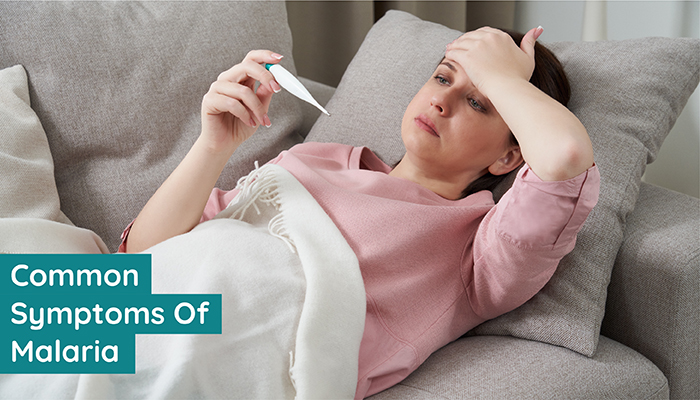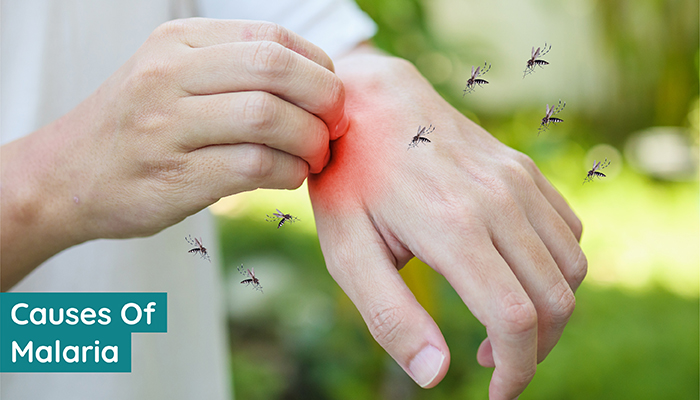Malaria is a potentially fatal mosquito-borne disease caused by the plasmodium parasite. This parasite enters the human body through the bite of an infected female Anopheles mosquito. It is known to be the only type of mosquito capable of transmitting malaria, usually after feeding on an infected person’s blood. Malaria is preventable and treatable but can be dangerous if not treated in time. This condition is not contagious, and you will not catch it from someone who has it. In tropical countries, where mosquito infestation is common, mosquito-borne diseases like malaria, dengue, and chikungunya are common. Malaria is also a global health threat, with about 619,000 people dying from it in 2021, according to the World Health Organization. Malaria is found in the red blood cells of a person, so it can spread through blood transfusion, organ transplant, and sharing needles. It can even be transferred through the womb from the mother to the child. Anyone can get malaria, though pregnant women, infants, children under the age of 5 years, the elderly, people with HIV/AIDs and autoimmune diseases can be at risk of developing a highly severe form of this condition.
What are malaria’s symptoms?
The first few signs and symptoms of malaria are usually headaches, chills, and a high fever. It’s hard to pinpoint that the reason behind these symptoms is malaria because these indicators could be a sign of any infection or bacterial disease. People who have had malaria several times may not or only have a few symptoms. The severity of the disease is determined by your age, health, and the type of malaria parasite you have. The parasite's incubation period can last anywhere from 7 to 30 days. This, however, depends on the type of malaria parasite that has infected you. Here are the most commonly occurring malaria symptoms: • High fever • Chills • Headache • Nausea and vomiting • General feeling of sickness and discomfort • Fatigue and weakness • Muscle and/or joint pain • Body aches • Sweats after which temperature returns to normal • Low blood platelet count • Abnormality in white blood cell populationThe symptoms of malaria can also include jaundice, abdominal pain, and diarrhoea. The surest way of confirming whether you have malaria is to take a diagnostic test. There are not different types of malaria as there are different types of malaria parasites that can infect humans with this illness. Some of them are known to be more fatal than the others. For instance, certain parasite species, such as Plasmodium falciparum, produce rapid symptoms after exposure, whereas symptoms of malaria fever from P. malariae have a slower onset. Here is a look at the four different malarial parasites:
Plasmodium vivax: It is the parasite known to cause the most deaths post infection. It’s the most widespread of the malarial parasite species, causing the most cases of this disease. Nearly 2.5 billion people are at risk of developing malaria symptoms because of p. vivax. Plasmodium falciparum: It is also known to cause the maximum cases of malaria and considered the deadliest species of plasmodium. If malaria from this parasite is not treated within 24 hours, then the illness can lead to grave damage to the central nervous system and can even cause death. Plasmodium malariae: It is more common in sub-Saharan Africa and southwest Pacific but still is rare. Plasmodium ovale: It is also rare as compared with p. vivax and p. falciparum. Severe malaria
Malaria can be severe in rare cases, causing long-term impairment and even the risk of death. People who are living in areas where malaria is common are at risk of developing severe anaemia. So are pregnant individuals, children, older adults, and those who have immunocompromised systems. Severe malaria is also caused when the patient does not have quick enough access to treatment or if the treatment is delayed for some other reason.
Treatment of malaria symptoms
The diagnosis of malaria can be performed through blood tests and antigen testing. The results are usually quick and accurate enough for the doctors to begin the treatment course. Acting quickly is key to tackling this disease so that it does not worsen and cause any long-term damage. Usually, two weeks is what it takes to fully recover from malaria. Here are some factors that can influence the type of medication you will be given: • Your age • The region where you are • The species of parasite that has caused the infection • Medical history and general health • Drug allergies • Current medication that may clash with new medicines • Whether you’re pregnantBesides that, there is now a malaria vaccine that is usually given to children so that they develop antibodies against the parasite. A pilot programme undertaken by the WHO in Ghana, Kenya, and Malawi from 2019 to 2021 has shown positive results.


